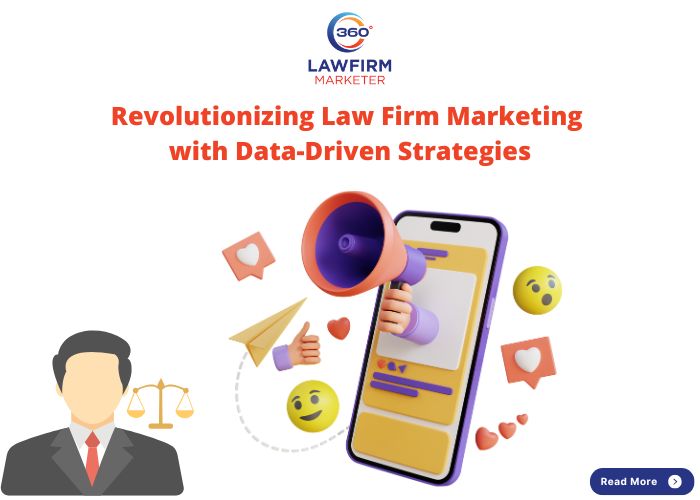Revolutionizing Law Firm Marketing with Data-Driven Strategies

In a highly competitive legal marketplace, data has become a cornerstone of effective law firm marketing. Traditional approaches focused on broad brand awareness and general outreach are no longer sufficient in meeting the expectations of today’s clients. Modern legal marketing is now driven by data insights that enable firms to tailor their strategies with precision, ensuring that every message, campaign, and client interaction is relevant and impactful.
Data analytics empowers law firms to understand client behaviour, preferences, and needs at a granular level. This allows for the development of personalised marketing campaigns, targeted content, and strategic client engagement efforts. By analysing trends, tracking client journeys, and leveraging tools like CRM systems, firms can segment audiences and optimize communications to resonate with specific client groups.
Moreover, data provides measurable results, allowing firms to assess campaign effectiveness in real time and make informed adjustments. Metrics such as website traffic, email open rates, and conversion rates help refine future marketing strategies for greater efficiency and return on investment.
Ultimately, firms that embrace data-driven marketing position themselves as forward-thinking, client-centric organisations. They not only stand out in a crowded field but also build stronger relationships, enhance credibility, and drive sustainable growth.
The Power of Data in Law Firm Marketing
Law Firm Marketing is undergoing a fundamental shift, with data analytics transforming how legal professionals understand and interact with their audiences. By analysing client demographics, behaviour patterns, and feedback, firms can craft more targeted campaigns and deliver more relevant content.
Tools like Customer Relationship Management (CRM) software allow firms to consolidate client data—ranging from inquiry histories to post-case feedback. This enables firms to:
- Leverage CRM systems to design personalised and data-backed marketing strategies.
- Segment clients based on their preferences or case types to deliver tailored messaging.
- Monitor emerging trends using predictive analytics to stay ahead of client needs.
Personalised Engagement Through Data
One of the biggest benefits of data-driven law firm marketing is the ability to personalise client engagement. Instead of relying on one-size-fits-all content, firms can respond directly to individual client preferences.
For example, if analytics show that visual content like infographics resonates more with your audience, adjusting your content strategy accordingly can lead to higher engagement. Similarly, segmenting clients such as identifying those interested in self-service legal content—allows firms to offer targeted resources like guides or FAQs, increasing value and trust.
Boosting Client Acquisition with Insight
Sustainable growth in any law firm depends on consistently attracting new clients. Data analytics provides a roadmap for this by revealing trends in client inquiries and market demands.
Take seasonal patterns, if historical data indicates a rise in real estate law inquiries each spring, firms can pre-emptively launch related campaigns to capture that interest. Or, if online searches spike around fraud-related legal advice, criminal law firms can proactively develop educational content or webinars, positioning themselves as experts in that field.
Tracking Performance and Proving ROI
What sets data-driven law firm marketing apart is its ability to track and measure success in real-time. Instead of guessing what works, firms can monitor key metrics—such as conversion rates, website traffic, and engagement—to refine their strategies.
For instance, if blog posts on intellectual property law consistently attract higher traffic and shares, it’s a clear signal to produce more content in that niche. Monitoring newsletter click-through rates or bounce rates also offers direct feedback for content optimisation.
This ongoing analysis ensures smarter allocation of marketing resources, helping firms invest where it matters most.
FAQs
1. What is data-driven marketing in a law firm context?
Data-driven marketing uses analytics to understand client behavior, preferences, and trends. This allows law firms to create targeted, relevant campaigns that improve engagement and results.
2. How can CRM tools help law firm marketing efforts?
CRM (Customer Relationship Management) tools centralize client data—like inquiry history and feedback—which firms can use to segment audiences and craft personalized marketing strategies.
3. What types of data should law firms be tracking?
Key data includes website traffic, blog engagement, email open/click rates, client inquiries, feedback, and search trends essential for refining outreach and improving ROI.
4. Can data really improve client acquisition?
Yes. Analytics help law firms identify what services are in demand, when, and from whom. This enables timely, strategic campaigns that attract high-quality leads.
5. How do law firms measure marketing success using data?
By tracking metrics such as conversion rates, bounce rates, and content engagement, firms gain insights into what’s working and where to improve, ensuring ongoing optimization.
Conclusion
The future of law firm marketing is data-driven. By embracing analytics, firms can create personalised campaigns, better understand client needs, and track performance more accurately. Turning raw data into actionable insights helps law firms attract the right audience, enhance engagement, and strengthen client relationships. In a competitive legal landscape, data enables smarter decision-making, efficient resource allocation, and continuous improvement. Firms that leverage analytics position themselves as innovative, client-focused leaders—building trust, increasing visibility, and driving sustainable growth. Data isn’t just a tool, it’s the foundation of successful law firm marketing today.




